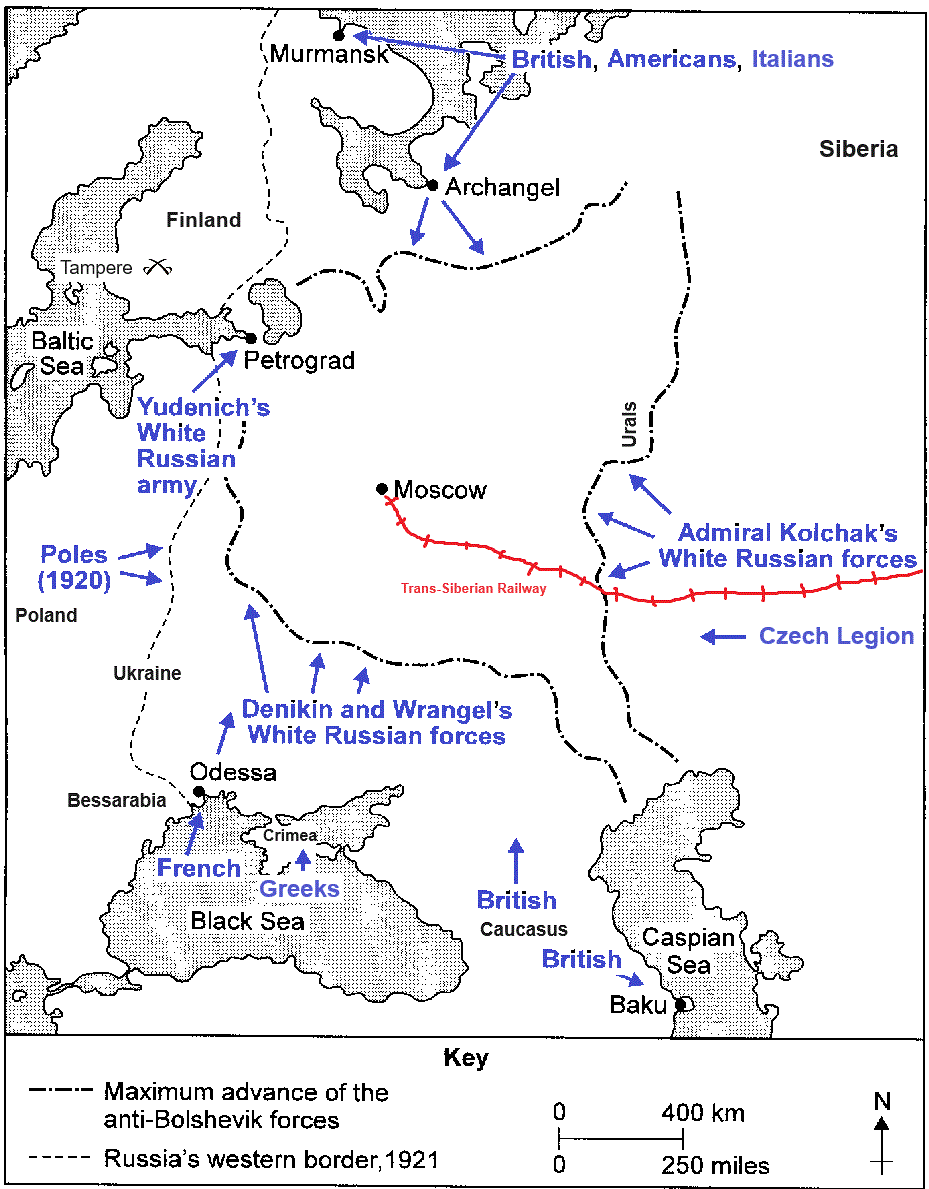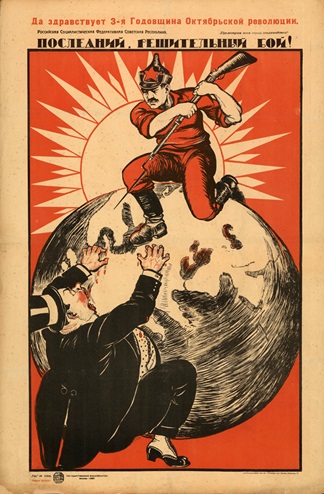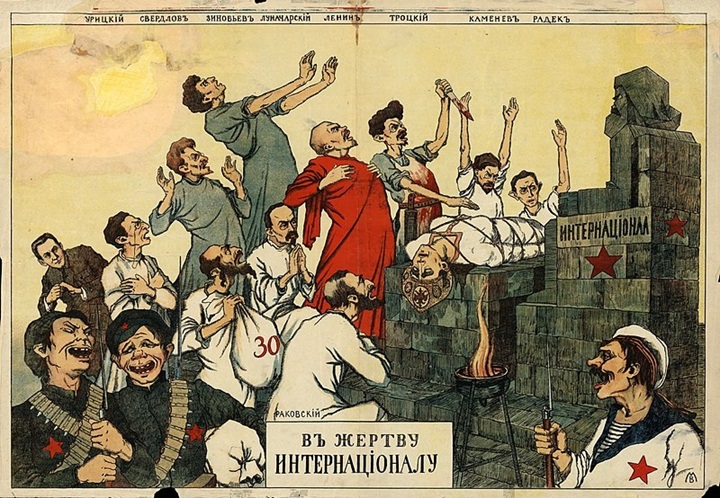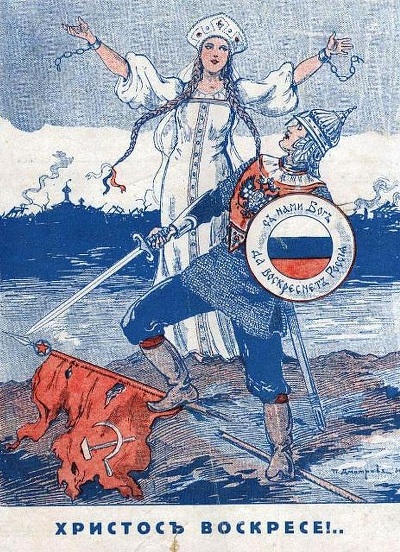|
|
|
|
Summary The Bolsheviks' political enemies in Russia – 'the Whites' – tried to bring down the Revolution. They were joined by America, Britain, France and Japan; nationalist groups seeking independence; and peasants angry about the Prodrazverstka. However, the disunity of the Whites, and the ruthlessness of the Bolsheviks ('the Reds') meant that the Revolution survived.
Source AThe Internationale Arise, ye slaves who know starvation!
The Internationale (translated) was the national anthem of the USSR. Its words explain why the western governments were so hostile to Communist Russia.
|
Going DeeperThe following links will help you widen your knowledge:
Russian Civil War - BBC Bitesize
Old Bitesize - simple intro (pdf) Civil War - good notes Life in Russia during the Civil War - Lionel Kochan (1970)
YouTube Why the Reds Won - 3-min History
Old textbook accounts of the Civil War Reed Brett, European History (1967)
|
Causes of the Civil War [ONE JC]
The Russian Civil War is often presented as a simple struggle between 'Reds' (Bolsheviks) and 'Whites'. In reality, says historian Robert Gerwarth, it was "a series overlapping and mutually reinforcing conflicts" including: a civil war between Lenin's Bolsheviks and their political opponents; separatist attempts by nationalists to break free from the Russian Empire; peasants rebelling against the Prodrazverstka; invasions by a number of foreign powers trying to destroy Communism; a war with Japan; and a successful revolt of a group of Czech prisoners-of-war ... all at the same time! It truly was 'the-Bolsheviks-against-the-world', and on the face of it amazing that the Bolsheviks should survive, never mind triumph. There were a
number of causes of the Civil War: 1. Opponents of the BolsheviksThe Bolsheviks had seized power by a coup d’état. After 1918, their political opponents united to fight back:
2. Nationalist rebellions
3. EntenteThe Entente allies of WWI – Britain, France and the USA – entered the Civil War. They were concerned about talk in Russia after the October Revolution of causing a 'world revolution' as the Bolsheviks had done in Russia – plus the Bolsheviks had seized the money and munitions the Allies had lent to the Tsar.
After the First World War, however, NOBODY really wanted to fight, and the Americans, French and British had all gone home by the end of 1919.
4. Japanese invasionJapan sent 70,000 troops. They landed at Vladivostok in 1918 and fought their way towards Lake Baikal. The Japanese also occupied all Russia's Pacific seaports. When the Allies withdrew, the Japanese stayed on until October 1922. Japanese companies such as Mitsubishi opened offices in the region, bringing wth them 50,000 settlers. It was suspected they they hoped to annex the area, but – after diplomatic pressure from America – they withdrew and in 1925 made peace with the USSR on the basis of the 1905 Treaty of Portsmouth.
5. Czech LegionIn 1918 some 50,000 Czech prisoners of war who were being taken across Russia mutinied, took control of the Trans-Siberian Railway, and attacked towards Moscow.
|
A map showing all places mentioned in the text. Click on the map to bring up a larger image.
Consider:1. How might Source A explain the violence of the Rusian Revolution? How might it explain th Bolshevik's success? 2. At first glance, the list of the Bolshevik's opponents looks overwhelming; however, looking at the list and the 'Events of the Civil War', can you spot any weaknesses in the Whites' position?
|
|
Events of the Civil War, 1918-22
|
Source BThis 1919 Bolshevik poster shows the three White generals Denikin, Kolchak and Yudenich as three vicious dogs ... which are under the control of America, France and Britain. (A poem accompanied the picture.)
|
Source C
A 1920 Bolshevik poster entitled ‘The Last Battle’ shows a Red Army soldier knocking a capitalist businessman off the world.
|
Consider:3. Study Sources B-C. Explain the meaning and symbolism of the posters, and the intended effect on those seeing them.
|
Source D
This White poster is entitled 'Sacrifice to the International [Communism]', and shows Mother Russia on an altar to Karl Marx. Bolshevik leaders are named along the top - including Lenin (in red) and Trotsky (holding the knife). In the foreground are racist and antisemitic stereotypes of Bolshevik supporters.)
|
Source E
A White poster entitled ‘Christ is Risen!’ shows a White Army soldier trampling a Red flag in front of Mother Russia.
|
Did You KnowThe Whites regarded their propaganda effort as "a total failure ... half-hearted, badly organised ... without an appealing ideology ... and in fact brought more harm than good".
Consider:4. Study Sources D-E. Explain the meaning and symbolism of the posters, and the intended effect on those seeing them.
|
Why The Bolsheviks Won The War
1. Whites' DisunityThe Whites were disunited and their armies thousands of miles apart. They quarrelled, and did not co-ordinate their attacks, so Trotsky could fight them one by one.
2. Trotskywas a brilliant war leader and strategist, so the Red Army had good tactics.
3. BeliefMany Reds were Communists, who believed they were fighting for a better world. Others fought for them because they hated foreign (British, American and French) armies invading Russia. This made the Bolshevik soldiers fervent and enthusiastic.
4. War CommunismThe Bolsheviks nationalised the factories, and introduced military discipline. Strikes were made illegal. Food was rationed. Peasants were forced to give food to the government. This gave the Bolshevik armies the supplies they needed..
5. TerrorThe CHEKA murdered any Whites they found – more than 7000 people were executed, and Red Army generals were kept loyal by taking their families hostage – so the Bolsheviks were united.
6. WherewithalThe Bolsheviks had control of the main cities of Moscow and Petrograd (with their factories), control of the railways (vital), an army of 300,000 men, very strict army discipline, and internal lines of communication – giving them the advantage in the war.
|
|
Source FAn account of Bolshevik ruthlessness Right from the start the Red Army killed all the White officers they took prisoner. They shot them or cut their medals off and gouged out their chests. from the memoirs of George Novikoff, a White Russian, written in the late 1980s.
Source GAn interpretation of the Civil War The Communist Party sent the best of its members to join the Red Army. By the end of 1918 the Red Army numbered 1,700,000. It was a strong force. Even so, on every battlefront Red Army units had to fight against an enemy who was better equipped, better trained and who outnumbered them. in History of the USSR (1981) by Y Kukushkin, a Soviet historian.
Source HAnother interpretation of the Civil War From the winter of 1918-19 Kolchak and Denikin faced a struggle against great odds. The Bolsheviks had had a year to strengthen their position. They controlled most of the resources of old Russia. They had more popular support, and their forces outnumbered those of the Whites by ten to one. from The Russian Civil War (1987), by E Mawdsley, a British historian.
Source IAnother interpretation of the Civil War The reasons for the final victory of the Bolsheviks in the Civil War are not difficult to understand. The victory was due to the weaknesses of the Whites. The various White armies fought as separate groups. The only aim they had in common was to overthrow the Bolsheviks. They were unwilling to sacrifice their individual interests in order to form a united anti-Bolshevik front. This allowed the Red Army to pick off the White armies one by one. The Whites were too scattered geographically to be able to put sufficient pressure on the Bolsheviks. from Russia 1881–1924 (1992), by Michael Lynch, a British A-level book.
Source JStalin's interpretation of the Civil War We did not despond, we did not lose heart. In the fire of war we forged the Red Army and converted our country into a military camp. The spirit of the great Lenin animated us in the war against the invaders. And what happened? We routed the invaders, recovered all our lost territory, and achieved victory. Joseph Stalin, Speech Delivered at the Red Army Parade on the Red Square, 1941.
|
Consider:5. What made the Whites such a threat to the Bolsheviks in the Civil War? 6 Sources G and H were both written by historians but give very different interpretations of the Civil War. Why do you think their interpretations differ? Explain your answer using Sources D and E and your own knowledge. . 7. "The Bolshevik success in the Civil war was due to the weaknesses of the Whites." Do you agree or disagree with this interpretation? Explain your answer using Sources G and H and your own knowledge.
|
|
|
|
|
Spotted an error on this page? Broken link? Anything missing? Let me know. |
|



